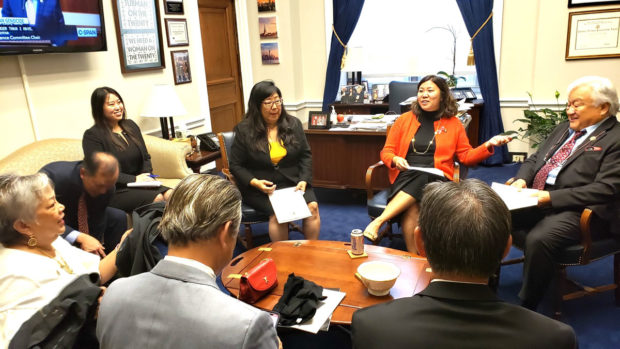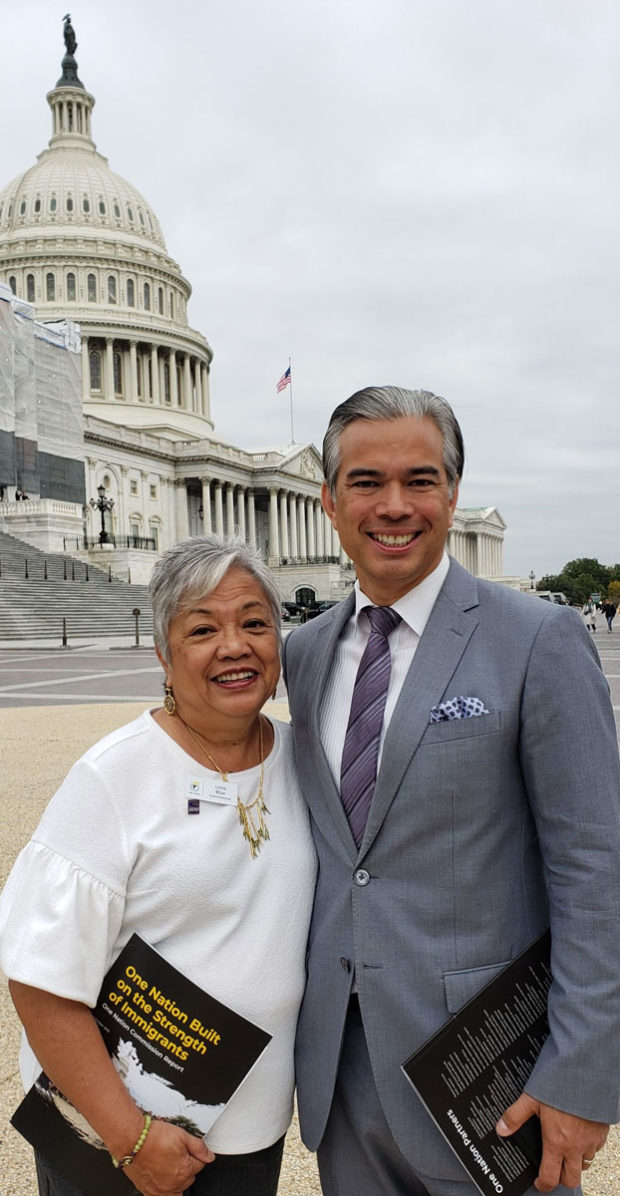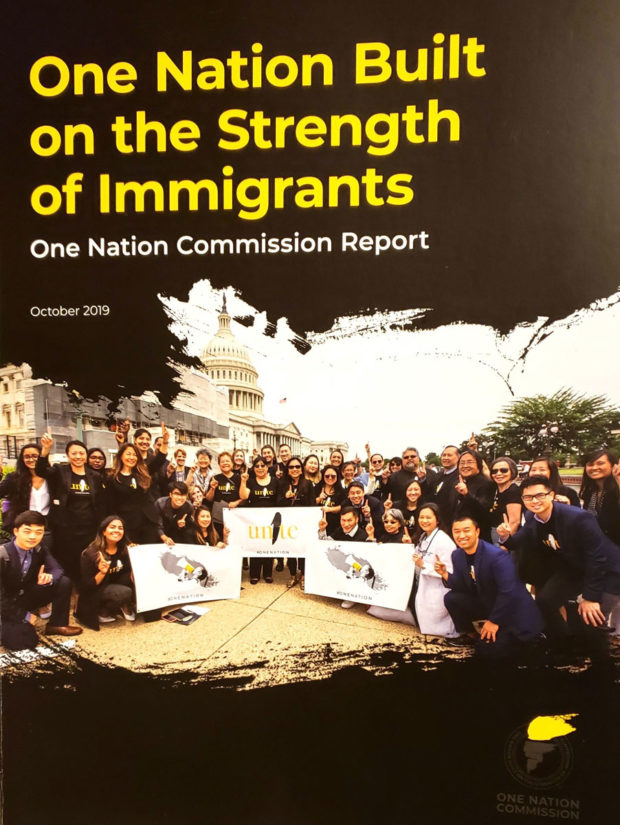First-ever ‘One Nation’ report counters Trump immigrant-bashing

One Nation Commission co-chair Sherry Hirota introduces members of Congress and other commission members at a press conference in Capitol Hill announcing public release of the One Nation Commission Report. Speakers include, from left, Commission co-Chair Mike Honda, Rep. Barbara Lee, Luisa Blue, Rep. Ruben Gallego, Rep. Judy Chu, Rob Bonta, Daniel Chao, Kyu Rhee, Tung Nguyen and Ignatius Bao. INQUIRER/Jon Melegrito
WASHINGTON, D.C. — “We have been here before and we will prevail again,” declared Sherry Hirota, co-chair of the One Nation Commission, a coalition of Asian and Pacific Islander American advocates formed last year to counter what they see as a recurring wave of “anti-immigrant fervor, scapegoating, hysteria and violence.”
At a news conference held in front of the U.S. Capitol on October 29, Hirota – who was joined by Commission Co-Chair ex-Congressman Mike Honda, AAPI national leaders and members of Congress – announced the public release of the One Nation Commission Report: “One Nation Built on the Strength of Immigrants.”
The 50-page report, Hirota said, builds the case that immigrants make significant contributions to U.S. economy and society, contrary to “false and distorted claims” by the Trump administration that they steal jobs from Americans.

Commission members deliver a copy of the report to Rep. Grace Meng (NY-6), who urged them to “continue the conversation and tell people not to be scared.” INQUIRER/Jon Melegrito
With this report, “we are determined to stop Trump’s xenophobic agenda and his cruel and heartless assault on immigrants,” said Rep. Barbara Lee (CA-13). “We are here to change the narrative of immigration in America, from immigrants being a burden to immigrants making America strong.”
It’s a narrative of “constant attacks on immigrants,” said Honda, who served for 16 years in Congress. He called on all Americans to “fight bigotry and embrace newcomers… people who have come here in search of freedom, just as my grandparents and so many of our forebears did.”
Rep. Judy Chu (CA-27), Chair of the Congressional Asian Pacific American Caucus (CAPAC), said she welcomed the report, which was personally distributed to all members of Congress after the press conference.
As sponsor of H.R. 3222, which aims to prohibit use of federal funds to implement Trump’s new public charge rule on immigration, Chu expects to gain more support for her bill from her colleagues. It currently has 114 co-sponsors.
Other speakers included: Rep. Ruben Gallego (AZ-27), First Vice Chair of the Congressional Hispanic Caucus; California Assembly Member Rob Bonta (AD-18); SEIU Executive Vice President Luisa Blue; Tung Nguyen, Chair of AAPI Progressive Action; IBM Vice President Kyu Rhee; and former Bechtel president and CEO Dan Chao.
‘Policy of exclusion’
What prompted the alarm and outrage was a proposed public charge regulation published by the Department of Homeland Security in October last year. The new rule would make it easier for the government to deny visas and green cards to individuals who avail of a host of non-cash welfare programs, such as health care and food stamps. Personal traits like age and English-speaking ability could also be grounds for denial.

Labor leader Luisa Blue and California State Legislator Rob Bonta are members of the One Nation Commission, which includes AAPI business leaders, civil rights activists and community advocates. INQUIRER/Jon Melegrito
Currently, immigration officials can only deny a non-citizen’s application for a visa or permanent residence if that person is primarily dependent on the government for cash assistance and “long-term institutional care.” But the expanded definition of public charge, advocates say, would also make it more difficult even for permanent residents with financial security, to sponsor their closest relatives.
Scheduled for implementation last October 15, the new public charge rule was blocked temporarily by five federal courts. They found that the DHS rule is an “arbitrary and capricious” action by the executive branch. The New York District Court Judge George B. Daniels called it “a new agency policy of exclusion in search of a justification.”
Stories and statistics
The commission report highlights personal success stories of immigrants and data from numerous studies, which prove that “immigrants are a benefit to society, and they make America stronger, despite misleading and false claims to the contrary.” According to studies cited, immigrants contribute significantly to the U.S. economy and workforce, public health and the electoral arena.
Among the stories is an essay, “Through a Child’s Eyes” by Helen Zia, daughter of Chinese immigrants, author and civil rights activist. She recalls how her family, back in the mid-1950s, had access to treatment for her mother’s serious illness.

One Nation Report details contributions of immigrants to the United States. INQUIRER/Jon Melegrito
“The Public Charge rule was on the books then,” she writes. “But the rule didn’t apply to immigrant families in need of basic health care, food our housing assistance. Now this White House is using Public Charge as a cudgel, forcing lawful immigrants to choose between protecting their families’ health and safety with the basic benefits they are eligible to receive, or jeopardizing their immigration status.”
In time, Zia adds, her parents became U.S. citizens. They raised six children who became public servants, served in the U.S. military and achieved professional success in commerce and banking. “If my family had been torn apart by deportation or devastated by untreated illness, none of these contributions could have happened.”
Compelling facts and data are also cited in the report to “shift the narrative and fight public charge.” Kyu Rhee, a member of the commission, pointed out that new immigrants will become “the engine of innovation and creativity” in U.S. industry. “Different perspectives and experience are the lifeblood for companies and organizations to be able to deliver to the people they serve,” he said. “Diversity of the work force is essential to a thriving society.”
The report notes that AAPIs have wielded a combined $455.6 billion in purchasing power, owned more than 500,000 businesses that employed more than 4.4 million workers and generated more than $690 billion in revenues.
Moreover, AAPI households contributed $184 billion in taxes to government coffers in 2012 alone. AAPIs boost the nation’s scientific and technological competitive lead in the world economy and play a huge role in health care delivery.
“Immigrants are an essential part of our U.S. labor infrastructure,” said Luisa Blue, the highest AAPI official in the U.S. labor movement. “Immigrants help our health care industry, our high tech industry, government services. Without immigrants, America’s workforce will shrink and suffer.”
Next steps
With more than 100 partners, One Nation plans to build on the momentum generated last fall when AAPIs spoke out through more than 23,000 public comment submission, out of a total of 267,000.
By keeping engaged in court battles and legislative debates in Congress, advocates hope to thwart the Trump administration’s punitive moves by stepping up organizing efforts and making communities more aware of what they’re up against.
The “tenuous victory” in the courts, organizers say, means “the pressure is on to influence the body politic from all directions to ensure Public Charge is blocked permanently.”
On the state and local level, there are legislative initiatives to block implementation of the newly expanded rule.
Rob Bonta, now in his seventh year as a state legislator, has sponsored such a resolution in the California state assembly. His ACR 1 would “condemn regulations recently adopted by the Department of Homeland Security to prescribe how a determination of inadmissibility for a person who is not a citizen or national is made based on the likelihood that the person will become a public charge.”
The commission and its coalition partners vowed to collectively stand up and fight back as one force and one voice and stay engaged in the courts, in the halls of Congress, in the streets and at the polls.
To order copies of the report, go to www.onenationcommission.org or www.onenationaapi.com.

